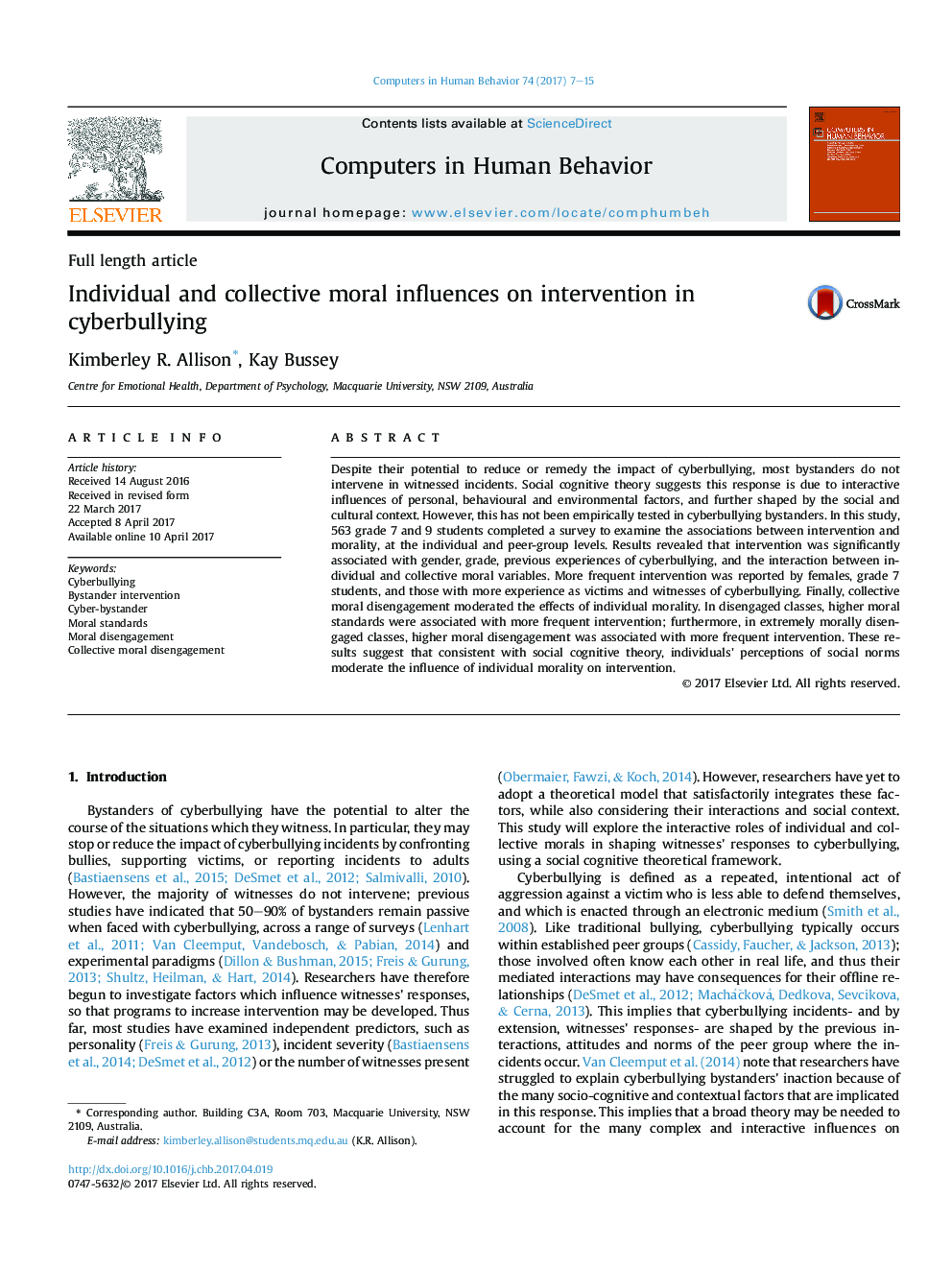| کد مقاله | کد نشریه | سال انتشار | مقاله انگلیسی | نسخه تمام متن |
|---|---|---|---|---|
| 4937230 | 1434617 | 2017 | 9 صفحه PDF | دانلود رایگان |
عنوان انگلیسی مقاله ISI
Individual and collective moral influences on intervention in cyberbullying
ترجمه فارسی عنوان
تاثیرات اخلاقی فردی و جمعی در مداخله در سوء برداشت اینترنتی
دانلود مقاله + سفارش ترجمه
دانلود مقاله ISI انگلیسی
رایگان برای ایرانیان
کلمات کلیدی
ترجمه چکیده
علیرغم توانایی خود برای کاهش یا اصلاح تاثیر سوء برداشت اینترنتی، بیشتر افراد بیگانه در حوادث شاهد دخالت نمی کنند. نظریه شناختی اجتماعی نشان می دهد که این پاسخ به دلیل تأثیرات تعاملی عوامل فردی، رفتاری و محیطی است و بیشتر به شکل اجتماعی و فرهنگی شکل می گیرد. با این حال، این مورد از لحاظ تجربی در مورد افراد متجاوز سایبری مورد آزمایش قرار نگرفته است. در این مطالعه، 563 نفر از دانشجویان کلاس 7 و 9 دانشجویان برای بررسی ارتباط بین مداخله و اخلاق در سطح فردی و هم گروهی، بررسی کردند. نتایج نشان داد که مداخله به طور معناداری با جنس، درجه، تجارب گذشته از سوءرفتار سایبری و تعامل بین متغیرهای اخلاق فردی و جمعی رابطه معنی داری دارد. مداخله مکرر توسط زنان، دانش آموزان درجه 7 و افرادی که تجربه بیشتری دارند به عنوان قربانیان و شاهدان اذیت و آزار سایبری گزارش شده است. در نهایت، انحصار اخلاقی جمعی، تأثیرات اخلاق فردی را تعدیل کرد. در کلاس های غیر فعال، استانداردهای اخلاقی بالاتر با مداخلات مکرر همراه بود؛ علاوه بر این، در کلاسهای بسیار غیر اخلاقی، اخلاق بالاتر، با مداخلات مکرر همراه بود. این نتایج نشان می دهد که سازگاری با تئوری شناخت اجتماعی، درک افراد از هنجارهای اجتماعی، تأثیر اخلاق فردی را بر مداخله می سنجد.
موضوعات مرتبط
مهندسی و علوم پایه
مهندسی کامپیوتر
نرم افزارهای علوم کامپیوتر
چکیده انگلیسی
Despite their potential to reduce or remedy the impact of cyberbullying, most bystanders do not intervene in witnessed incidents. Social cognitive theory suggests this response is due to interactive influences of personal, behavioural and environmental factors, and further shaped by the social and cultural context. However, this has not been empirically tested in cyberbullying bystanders. In this study, 563 grade 7 and 9 students completed a survey to examine the associations between intervention and morality, at the individual and peer-group levels. Results revealed that intervention was significantly associated with gender, grade, previous experiences of cyberbullying, and the interaction between individual and collective moral variables. More frequent intervention was reported by females, grade 7 students, and those with more experience as victims and witnesses of cyberbullying. Finally, collective moral disengagement moderated the effects of individual morality. In disengaged classes, higher moral standards were associated with more frequent intervention; furthermore, in extremely morally disengaged classes, higher moral disengagement was associated with more frequent intervention. These results suggest that consistent with social cognitive theory, individuals' perceptions of social norms moderate the influence of individual morality on intervention.
ناشر
Database: Elsevier - ScienceDirect (ساینس دایرکت)
Journal: Computers in Human Behavior - Volume 74, September 2017, Pages 7-15
Journal: Computers in Human Behavior - Volume 74, September 2017, Pages 7-15
نویسندگان
Kimberley R. Allison, Kay Bussey,
